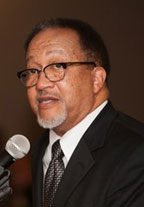 Connecting the Orangeburg and Charleston massacres
Connecting the Orangeburg and Charleston massacres
By Benjamin F. Chavis, Jr., NNPA Columnist
History is more than a cumulative knowledge of the facts of the past. For Black Americans and for African people in particular all over the world, history is also the sacred depository or record of a calendar of events that have contributed to the defining moments of our long struggle for liberation, freedom, justice, equality and empowerment.
Certainly the state of South Carolina is one of those many places where the awful brutal bloody sacrifices, as well as the resilient achievements of Black Americans, are well documented and remembered. While we have finally witnessed the taking down of the racist Confederate flag from the state Capitol grounds in Columbia, S.C., we should all pause to understand the deeper implications for the present and future struggle to challenge the persistence of racism and racial injustice in America.
We salute the successful efforts of all those sisters and brothers in South Carolina and their allies to get the Confederate flag taken down. Of course that hateful symbol of African slavery, genocide and oppression still flies high in the hearts and minds of too many who still live in the state and elsewhere in the nation. Thus, we must remain vigilant and steadfast in our determination to advance the cause of freedom and equality.
The truth is that the June 17 racist terrorist massacre of nine Black Americans in Charleston inside of Mother Emanuel A.M.E. Church was not the first modern day massacre of Black Americans in South Carolina. We must also remember that on February 8, 1968 on the campus of South Carolina State University in Orangeburg, three Black American students were shot to death and more than 40 other young Black Americans were wounded in what became known as the “Orangeburg Massacre.”
At the time, South Carolina State University was one the leading Historically Black Colleges and Universities (HBCUs) in the nation both academically and athletically. As a college student in North Carolina during that period and working for Dr. Martin Luther King and the Southern Christian Leadership Conference (SCLC), I well remember that dreadful day when we heard about the massacre.
South Carolina Highway Patrolmen had indiscriminately fired shot guns, rifles and pistols at group of 200 unarmed Black American high school and college students who had peacefully assembled on the campus of South Carolina State University Feb. 8, 1968 to protest segregation of the All Star Bowling Lane. My good friend and young leader of the Student Nonviolent Coordinating Committee (SNCC) Cleveland Sellers Jr. was one of those injured and the only person convicted and jailed in connection with the protest.
Today, Sellers is the president of Voorhees College in Denmark, S.C., the city of his birth. At a recent meeting of HBCU presidents in Hilton Head, S.C. under the auspices of the National Association For Equal Opportunity in Higher Education (NAFEO), I listened carefully to Sellers as he reminded the gathering about the Orangeburg Massacre and its relevance to last month’s Charleston Massacre. Sellers cautioned, “We must remember that what happened in Charleston is not isolated from what happened to us in 1968 in Orangeburg.”
What will be raised up now in South Carolina? Will the state’s HBCUs receive adequate funding from the state legislature now that the flag is down? Have we seen the last of the House Budget Committee proposal to close South Carolina State University, the only public HBCU in South Carolina, for two years and fire all school administrators and trustees under the guise of allowing the university to reorganize its troubled finances? Will there be an end to racially motivated police brutality in South Carolina? Will there be more overall racial equality and justice in South Carolina in the aftermath of the Charleston Massacre?
We know these questions are not relevant just for the people who live in South Carolina. The questions concerning racial justice and equality are national questions that should continue to be raised and must be answered. Why is that some of us have to die tragically before there can emerge a momentary sense of national empathy and solidarity for the cause of equal justice?
From the massacres in Orangeburg to Charleston, S.C., we will not relent. We will not forget. We will not be silent. Instead, we will press on to make sure that the oppressive deaths of our sisters and brothers in South Carolina and throughout the world will not be in vain. One day we will overcome the oppression and the racism. Let’s rededicate ourselves to advance the freedom struggle. A luta continua!




Be the first to comment